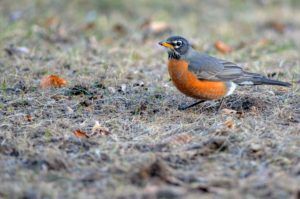MUCC’s AmeriCorps Member Taking the Li-bird-ty to Teach Youth About Birds
Traditionally, MUCC’s AmeriCorps member has run a small learning program for the youth campers at MUCC’s Youth Camp. This year I’ve decided on an introduction to birds and birding program to share with the campers. The program involves a nice bird hike with tips and tricks to start birding such as how to use binoculars and where best to look for birds. During the hike, we talk about the large variety of birds, from songbirds to waterfowl to our favorite game birds like wild turkeys. At the end of our hike, we do a hands-on activity showing the variety of beaks birds use in their lives to gather food using some common items like scissors, pliers, chopsticks, etc. Of course, during this time I have to share some fun facts with the youth about birds because I’m a bird nerd. Why birds and birding you may ask?

Michigan’s state bird: The American Robin
Birding provides many social opportunities, from clubs to festivals, to just a small local group it provides a sense of community. You can make fun competitions out of birding such as finding the most species over some time with a friend or just even to challenge yourself. You might get lucky and find a rare species that few have ever seen in the state, giving you some bragging rights. It can provide some sense of discovery and exploration as you go to new locations for birding and can provide some peaceful experiences. At the minimum birding gives you another excuse to go outside to enjoy the great outdoors, which is what we should always strive to do.
Birds can be helpful environmental health indicators as many birds are sensitive to changes in the environment. They also provide ecosystem services such as insect control and seed spreading, they also help fertilize the soil with their waste. My goal this season is to get young campers more interested in birds as they are extremely unique animals that are important to our environment but also to Michigan’s natural heritage.
The post MUCC’s AmeriCorps Member Taking the Li-bird-ty to Teach Youth About Birds appeared first on Michigan United Conservation Clubs.
Recent Posts



